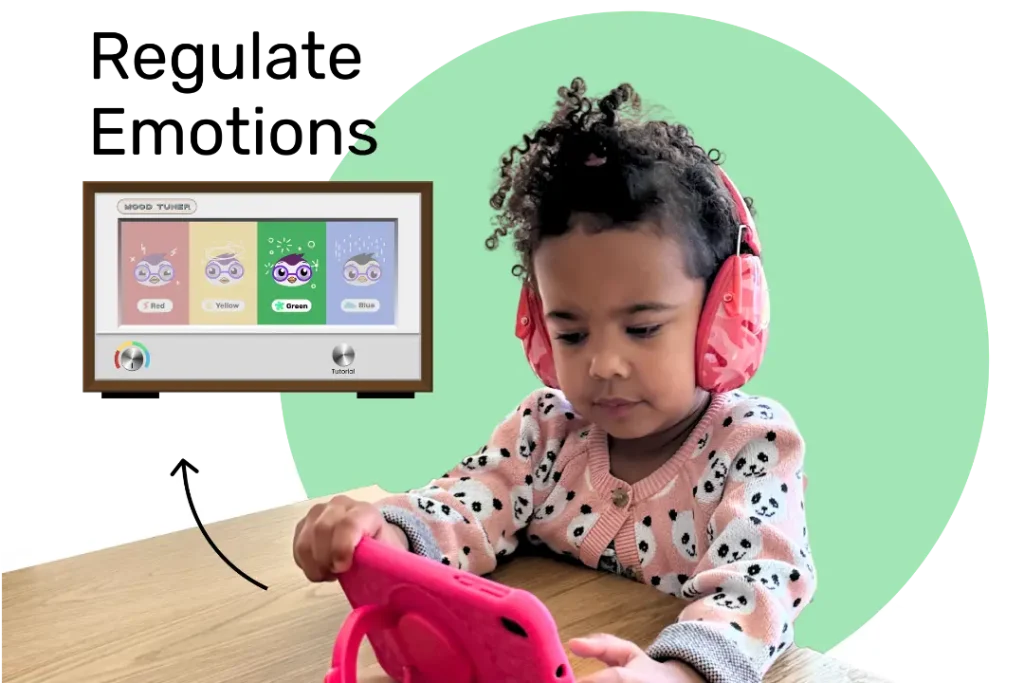As a parent, witnessing your child grapple with anxiety can feel like being stuck in a maze with no exit in sight. But here’s the good news: There are proven strategies to help your child navigate their anxiety. This guide sheds light on how to help kids with anxiety, particularly those who are neurodivergent. So, let’s embark on this journey together, shall we?
Table of Contents
Step 1: Understand Their Anxiety
First, let’s clarify: Anxiety isn’t a cookie-cutter condition. It can show up differently in every child, especially in neurodivergent kids. Some might retreat into their shells, while others may experience physical symptoms like stomachaches or headaches. Recognizing your child’s unique anxiety signs is the first step in helping them manage it.
For instance, Goally, a learning tablet for kids, has a range of apps that can help you track your child’s behavior patterns. This can be an effective way to identify triggers and signs of anxiety in your child.

Step 2: Create a Safe Space
Creating a safe space for your child is like giving them a comforting blanket in a thunderstorm. This isn’t just about a physical space but an emotional one, too. Being there for your child, listening to their worries, and reassuring them that it’s okay to feel anxious can help them feel secure and understood.
Here are a few ways to create a safe space:
- Encourage open communication: Let your child know they can talk to you about anything, anytime.
- Validate their feelings: Instead of dismissing their fears, acknowledge them and reassure your child that it’s okay to feel anxious.
- Use comforting language: Phrases like “I’m here for you” or “We’ll get through this together” can be very reassuring.
Step 3: Teach Them Coping Strategies
Now, let’s talk about coping strategies. Teaching your child ways to manage their anxiety is like giving them a toolkit they can use whenever needed. This could include deep breathing exercises, progressive muscle relaxation, or mindfulness techniques. The key is to find what works best for your child and practice it regularly.

Read more: What Causes Social Anxiety in a Child?
Goally’s apps can be a great resource here. They offer a variety of tools and activities designed to help kids with thinking and learning differences manage their anxiety.
Step 4: Seek Professional Help
However, there may be times when professional help is needed. A therapist or counselor who specializes in working with neurodivergent kids can provide additional support and resources. They can also help you develop a tailored plan to manage your child’s anxiety.
Remember, seeking professional help isn’t a sign of failure. It’s a sign of strength and a testament to your commitment to helping your child.
Step 5: Take Care of Yourself
Lastly, and most importantly, remember to take care of yourself. Parenting a child with anxiety can be a marathon, not a sprint. It’s essential to take time for self-care and seek support when needed. After all, you can’t pour from an empty cup.
Whether it’s taking a walk, reading a book, or taking a few moments to breathe, find what helps you recharge and prioritize it.
Goally | Kid’s Tablet for Building Emotional Regulation Skills
Is your child struggling with understanding and managing their emotions? Goally teaches emotional regulation skills in a fun and interactive way!

The Mood Tuner app encourages kids to look inwards and identify their feelings, helping them understand what’s going on inside. Once they’ve recognized their emotions, they can choose from a variety of exercises designed to help them self-regulate and find their balance.
In conclusion, understanding how to help kids with anxiety involves: Understanding their unique experiences. Creating a safe space. Teaching coping strategies. Seeking professional help. Caring for yourself. Each step is crucial in its own way, and together, they can make a significant difference in your child’s life. Remember, you’re not alone in this journey, and resources and support are available to help.

Goally
We help parents teach their kids life skills, like doing bedtime and morning independently. Backed by science, we incorporate evidence-based practices and expert-informed designs in all of our apps and content.





